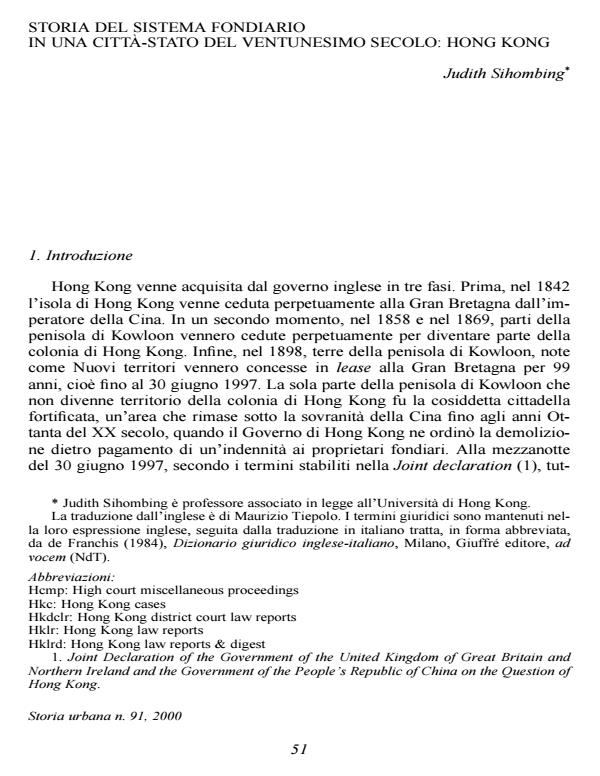Storia del sistema fondiario in una città-stato del Ventunesimo secolo: Hong Kong
Journal title STORIA URBANA
Author/s Judith Sihombing
Publishing Year 1 Issue 2000/91
Language Italian Pages 24 P. File size 88 KB
DOI
DOI is like a bar code for intellectual property: to have more infomation
click here
Below, you can see the article first page
If you want to buy this article in PDF format, you can do it, following the instructions to buy download credits

FrancoAngeli is member of Publishers International Linking Association, Inc (PILA), a not-for-profit association which run the CrossRef service enabling links to and from online scholarly content.
On the island of Hong Kong, the leasehold form of land tenure was introduced at the very beginning of British occupation (1841). It was then extended to Kowloon (1858) and the New Territories (1898), both of which were later acquired and which made up the English colony of Hong Kong until 1997. In that year, on the basis of the Sino-British Joint Declaration (1984), Hong Kong once again fell under Chinese sovereignty. In spite of this, however, Hong Kong has retained a certain autonomy as a Special Administrative Region, keeping, for example, the leasehold system in force. In particular, this article will examine land conversion, registration, and conveyancing legislation, co-ownership in multi-story buildings, adverse possession, building regulation, town planning, and the resumption of land. In each of these areas, Hong Kong’s land system presents particular characteristics: land use conversion is essentially limited to agricultural land (with the exception of the reclamation of land from the sea); there is a deed registration system as well as widespread unit ownership in multi-story buildings, for which there is no specific legislation; Chinese customary trusts exist in the New Territories; the occupation of land is permitted by means of adverse possession for the remaining term of the lease; failure to observe the terms of Building Ordinances is punished with the immediate removal of the unauthorized structure or the closure of the building; and the Government has the possibility to resume the land rather than acquire it by force.
Judith Sihombing, Storia del sistema fondiario in una città-stato del Ventunesimo secolo: Hong Kong in "STORIA URBANA " 91/2000, pp , DOI: